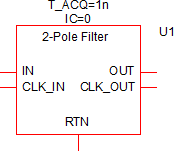2nd Order Discrete Time Filter
The 2nd Order Discrete Time Filter models a second order z-domain transfer function. The transfer function in the z-domain from the input I(z) to the output O(z) for the 2nd order discrete filter is shown below:

The difference equation representing this transfer function is:

To achieve various the two-pole discrete filters, follow these guidelines:
- For a two-pole discrete filter without any zero, set both N1 and N2 to zero.
- For a a two-pole discrete filter with a single zero, set N2 to zero and N1 to a non-zero value.
- For a two-pole, two-zero discrete filter, set both N1 and N2 to non-zero values.
The information in this topic refers to the latest 2nd Order Discrete Time Filter which was introduced in version 8.10. In versions prior to 8.10, a similar Discrete Time Filter exists and has the same behavior as the new version. The new version simulates slightly faster than the old version, but the electrical behavior is identical. If you require a discrete time filter for use in versions prior to 8.10, the old 2nd Order Discrete Time Filter can be placed from the part selector location: .
Related topics:
In this topic:
| Model Name: | 2nd Order Discrete Filter | |||
| Simulator: |  |
This device is compatible with the SIMPLIS simulator. | ||
| Parts Selector Menu Location: | ||||
| Symbol Library: | simplis_discrete_time_filters.sxslb | |||
| Model Library: | simplis_discrete_time_filters.lb | |||
| Subcircuit Name: | SIMPLIS_DTF_2POLE_FILTER_Y__V2 | |||
| Symbol: |
|
|||
| Multiple Selections: | Only one device at a time can be edited. | |||
Editing the 2nd Order Discrete Filter
To configure the 2nd Order Discrete Filter, follow these steps:
- Double click the symbol on the schematic to open the editing dialog to the Parameters tab.
- Make the appropriate changes to the fields described in the table below the image.
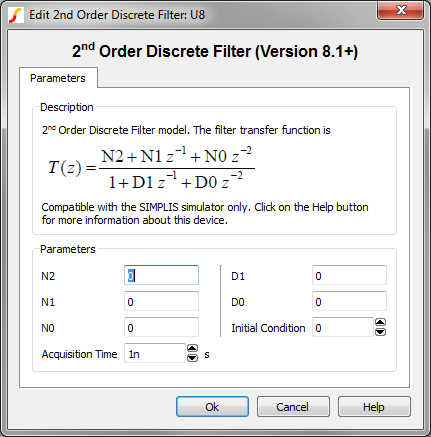
| Label | Parameter Description |
| N2 | Numerator constant term |
| N1 | Numerator constant term |
| N0 | Numerator coefficient for z -1 term |
| Acquisition Time | Filter acquisition time in seconds |
| D1 | Denominator coefficient for z -1 term |
| D0 | Denominator coefficient for z -1 term |
| Initial Condition | Initial condition of the Discrete Time Filter output at time=0 |
Examples
The test circuit used to generate the waveform examples in the next section can be downloaded here: simplis_033_2ndordfilter_example.sxsch.
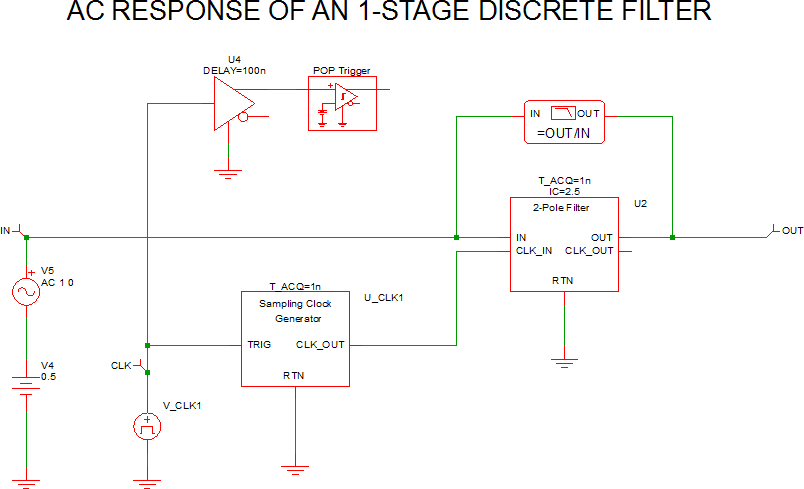
Waveforms
The POP waveforms below show that the DC input voltage to the filter is 0.5V and the DC output voltage is 2.5V, confirming that the DC gain of the 2nd order discrete time filter is 5.
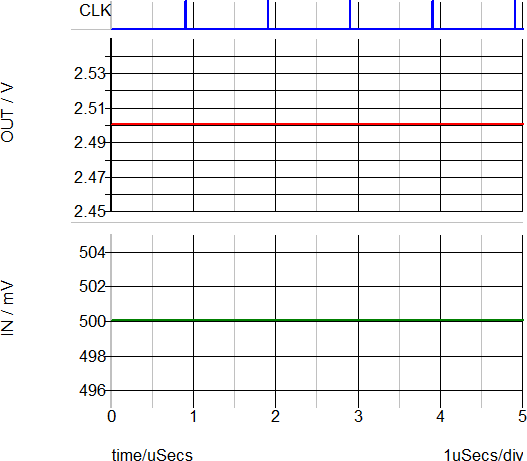
The following AC waveforms confirm that the DC gain is 13.98dB and the pole is approximately 1kHz.
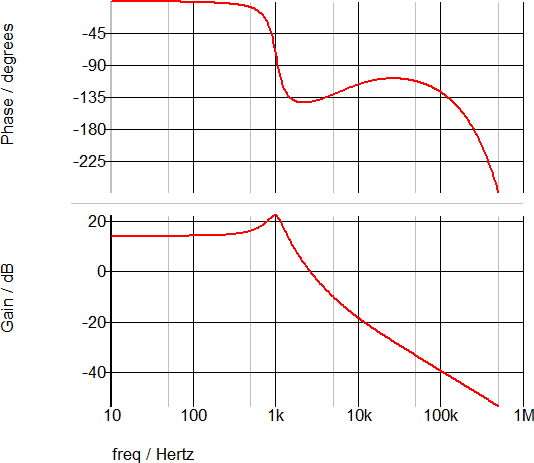
Subcircuit Parameters
The subcircuit parameter names, data types, ranges, units, and descriptions are in the following table. The parameter names can be used to generate netlist entries for the device. For example, a valid 2nd Order Discrete Time Filter netlist entry would be:
X$U1 26 30 0 29 0 SIMPLIS_DTF_2POLE_FILTER_Y__V2 vars: IC=0 N0=0 N1=0 N2=0 D0=0 D1=0 T_ACQ=1n
| Parameter Name | Label | Data Type | Range | Units | Parameter Description |
| D0 | D0 | String | none | Denominator coefficient for z -1 term | |
| D1 | D1 | String | none | Denominator coefficient for z -1 term | |
| IC | Initial Condition | Number |
|
none | Initial condition of the Discrete Time Filter output at time=0 |
| N0 | N0 | String | none | Numerator coefficient for z -1 term | |
| N1 | N1 | String | none | Numerator constant term | |
| N2 | N2 | String | none | Numerator constant term | |
| T_ACQ | Acquisition Time | Number | min: 1f | s | Filter acquisition time in seconds |
